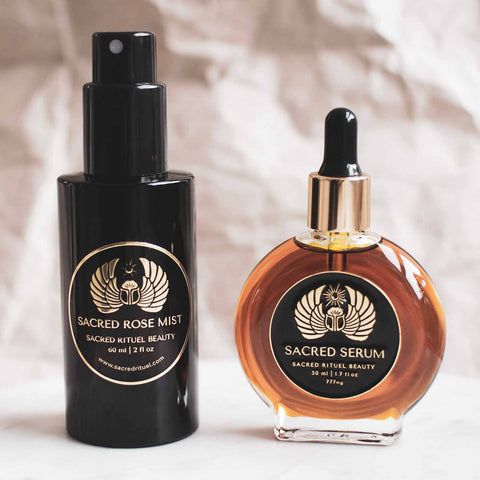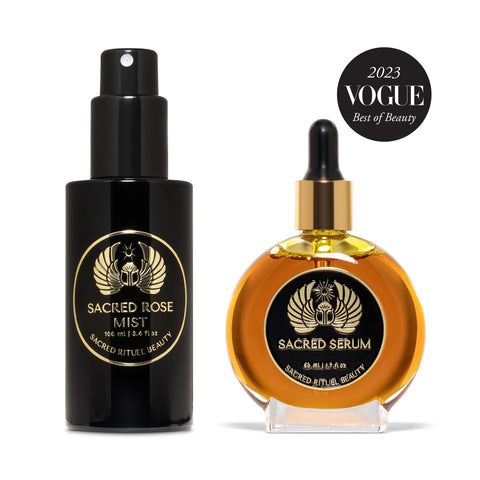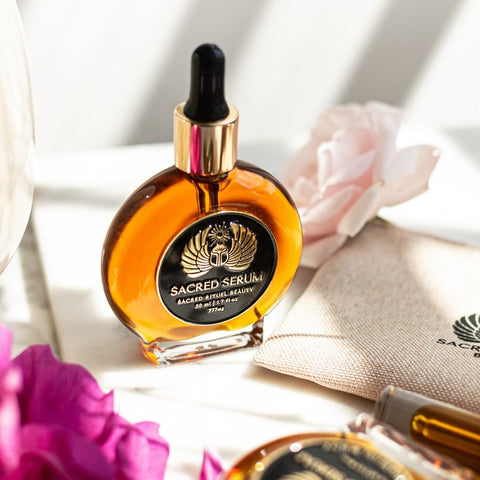Best Serum For Hyperpigmentation
At Sacred Rituel, we pride ourselves on crafting luxurious, organic skincare products that merge the wisdom of ancient beauty rituals with modern science. Our commitment to quality and efficacy is unmatched, making our Sacred Serum a leading choice for those seeking natural solutions to complex skin issues like hyperpigmentation.
Products formulated with Arnica to address reduce skin inflammation, bruising, and swelling.

Key Takeaways:
- Understanding Hyperpigmentation: Learn about the common causes and how they affect skin tone.
- Effective Ingredients: Discover the powerful ingredients in serums that target hyperpigmentation.
- Sacred Rituel's Solution: Explore why Sacred Rituel Face Oil is ideal for treating hyperpigmentation naturally.
Understanding Hyperpigmentation
Hyperpigmentation is a common skin condition characterized by the darkening of certain areas of the skin. This occurs when excess melanin, the pigment responsible for skin color, forms deposits in the skin. It can affect people of all skin types and is often caused by factors such as sun exposure, inflammation, hormonal changes, or skin injuries. Common forms of hyperpigmentation include sunspots, melasma, and post-inflammatory hyperpigmentation, which often occurs after acne heals.
Causes Of Hyperpigmentation
Hyperpigmentation occurs when certain areas of the skin darken due to excess melanin production. This section explores the primary causes, providing a clear understanding of what triggers hyperpigmentation and how these factors interact.
Sun Exposure
Sun exposure is a leading cause of hyperpigmentation. Ultraviolet (UV) rays from the sun stimulate melanin production as a protective response. However, prolonged or excessive sun exposure can lead to an overproduction of melanin, resulting in dark spots or patches, commonly known as sunspots or solar lentigines. These typically appear on areas most exposed to the sun, such as the face, hands, and shoulders. Consistent sun protection is vital to prevent and manage hyperpigmentation.
Hormonal Change
Hormonal fluctuations, especially during pregnancy or with the use of birth control, can significantly influence hyperpigmentation. Melasma, often triggered by these hormonal changes, manifests as dark, irregular patches on the face. Hormones make melanocytes more sensitive to sunlight, leading to increased melanin production. Managing hormonal health and using preventive measures are key for those prone to this condition.
Post-Inflammatory
Post-inflammatory hyperpigmentation (PIH) occurs after skin trauma or inflammation, such as acne or eczema. As the skin heals, it may produce excess melanin, leaving dark spots in the affected areas. PIH is more common in individuals with darker skin tones due to their naturally higher melanin levels. Effective management involves treating the underlying inflammation quickly and using gentle skin-healing treatments.
Medication-Induced Hyperpigmentation
Certain medications, including some NSAIDs, antibiotics like tetracyclines, and chemotherapeutic agents, can cause hyperpigmentation as a side effect. These drugs may increase melanin production or cause photosensitivity, making the skin more susceptible to UV-induced darkening. Understanding medication side effects and considering alternatives can help manage this form of hyperpigmentation.
Medical Conditions
Some medical conditions, such as Addison’s disease and hemochromatosis, can lead to hyperpigmentation. Addison’s disease, for example, increases ACTH production, which stimulates melanin. Hemochromatosis causes a bronze or grayish skin discoloration due to excess iron. Proper diagnosis and treatment of these underlying conditions are crucial for addressing the associated hyperpigmentation.
Key Ingredients To Look For In Serums For Hyperpigmentation
When selecting a serum to address hyperpigmentation, it's important to focus on ingredients that are proven to be effective in brightening the skin and reducing the appearance of dark spots. Here’s a list of key ingredients and their benefits:
- Vitamin C: This powerful antioxidant is well-known for its brightening effects on the skin. It helps to reduce the appearance of dark spots by inhibiting melanin production, leading to a more even skin tone. Additionally, Vitamin C protects the skin from oxidative stress caused by environmental factors like pollution and UV rays.
- Niacinamide (Vitamin B3): Niacinamide is celebrated for its anti-inflammatory properties, which can help reduce redness and irritation. It also works to minimize the appearance of dark patches by inhibiting the transfer of melanin to the skin's surface, resulting in a more uniform complexion. Furthermore, it strengthens the skin barrier, improving overall skin health.
- Retinoids: Retinoids, derived from Vitamin A, accelerate cell turnover, promoting the shedding of pigmented, damaged skin cells and revealing fresher, healthier skin underneath. Over time, consistent use of retinoids can significantly reduce the visibility of hyperpigmentation and improve skin texture.
- Natural Oils (Rosehip and Argan Oil): These natural oils are rich in essential fatty acids and antioxidants, which help soothe and hydrate the skin. Rosehip oil, in particular, is known for its ability to reduce the appearance of scars and dark spots due to its high content of Vitamin A and C. Argan oil is deeply moisturizing and helps maintain skin elasticity, supporting overall skin health and aiding in the healing process.
These ingredients, when included in serums, can play a vital role in treating and preventing hyperpigmentation, leading to clearer, brighter, and healthier-looking skin.
How To Incorporate A Serum Into Your Skincare Routine
Adding a serum to your skincare routine can be a game-changer, particularly when targeting issues like hyperpigmentation. Serums are concentrated treatments designed to deliver potent active ingredients deep into the skin. To maximize their effectiveness, it’s important to apply them correctly within your skincare routine. Here’s a step-by-step guide to seamlessly incorporating a serum into your regimen.
Start With A Thorough Cleansing
The first step in any effective skincare routine is cleansing. Cleansing removes dirt, oil, and impurities that accumulate on your skin throughout the day or night. By starting with clean skin, you ensure that the serum can penetrate more deeply and work more effectively. Choose a gentle cleanser suited to your skin type—whether it’s foaming, cream-based, or gel—to avoid stripping the skin of its natural oils while still ensuring a thorough clean.
Prepping Your Skin With Toner
After cleansing, applying a toner is an optional but beneficial step. Toner helps to balance your skin’s pH, which can be disrupted during cleansing. It also acts as a preparatory step, ensuring your skin is ready to absorb the active ingredients in the serum more efficiently. If you use a toner, apply it gently using a cotton pad or your hands, pressing it into your skin to refresh and hydrate.
Applying The Serum
Once your skin is prepped and clean, it’s time to apply your serum. Serums are typically lightweight and highly concentrated, so a little goes a long way. Dispense a few drops into your hands and gently pat the serum onto your face, focusing on areas where hyperpigmentation is most prominent. Patting rather than rubbing helps to distribute the serum evenly and ensures better absorption into the skin. Allow the serum to absorb fully into your skin for a minute or two before moving on to the next step.
Locking In The Benefits With Moisturizer
After applying your serum, the next crucial step is moisturizing. A good moisturizer seals in the serum’s active ingredients, preventing them from evaporating and ensuring they penetrate deeply into the skin. Moisturizers also provide essential hydration, creating a protective barrier that keeps your skin soft and supple. Choose a moisturizer that complements your serum and skin type, whether it’s a lightweight gel for oily skin or a rich cream for dry skin.
Protecting Your Skin With Sunscreen
Finally, if you’re incorporating a serum into your morning routine, it’s essential to follow up with sunscreen. Sunscreen is a non-negotiable step in any skincare routine, particularly when treating hyperpigmentation, as UV rays can exacerbate dark spots and counteract the effects of your serum. Apply a broad-spectrum sunscreen with at least SPF 30, ensuring complete coverage of your face and neck. Reapply as needed throughout the day, especially if you’re spending time outdoors.
Tips For Preventing Hyperpigmentation
Preventing hyperpigmentation is about taking proactive steps to protect your skin from factors that can cause or worsen dark spots. By understanding and implementing effective prevention strategies, you can maintain a more even skin tone and reduce the risk of developing hyperpigmentation. Here are essential tips to help keep your skin clear and healthy.
Prioritize Daily Sunscreen Use
One of the most effective ways to prevent hyperpigmentation is by using sunscreen every day. Ultraviolet (UV) rays from the sun are a leading cause of dark spots and can exacerbate existing hyperpigmentation. Choose a broad-spectrum sunscreen with an SPF of at least 30, and apply it generously to all exposed areas of your skin, even on cloudy days. Sunscreen should be reapplied every two hours if you are outdoors for extended periods, especially if you're swimming or sweating. By consistently using sunscreen, you can protect your skin from UV-induced damage and significantly reduce the risk of hyperpigmentation.
Wear Protective Clothing And Limit Sun Exposure
In addition to using sunscreen, wearing protective clothing is a crucial step in preventing hyperpigmentation. Wide-brimmed hats, sunglasses, and long sleeves can shield your skin from direct sunlight, reducing the chances of UV rays penetrating your skin and triggering melanin production. It’s also wise to avoid direct sun exposure during peak hours, typically between 10 a.m. and 4 p.m., when UV radiation is strongest. If you need to be outside during these times, seek shade whenever possible. These measures can help minimize sun damage and maintain an even skin tone.
Avoid Picking At Acne And Skin Injuries
Another key aspect of preventing hyperpigmentation is to avoid picking at acne, scabs, or any skin injuries. When you pick or irritate your skin, it increases inflammation and the likelihood of post-inflammatory hyperpigmentation (PIH). PIH occurs when the skin overproduces melanin in response to an injury or inflammation, leading to dark spots that can linger long after the skin has healed. To prevent this, it’s important to treat acne and other skin conditions gently and to allow injuries to heal naturally. Using products that promote healing without causing further irritation can also help reduce the risk of PIH.
Incorporate Antioxidants Into Your Skincare Routine
Antioxidants play a vital role in protecting your skin from environmental damage that can lead to hyperpigmentation. Vitamin C, in particular, is a powerful antioxidant that helps neutralize free radicals caused by sun exposure and pollution. By incorporating Vitamin C serums or creams into your daily skincare routine, you can help prevent the formation of dark spots and promote a more radiant complexion. Antioxidants also support overall skin health by enhancing your skin’s natural repair processes and boosting its resilience against external stressors.
Maintain A Consistent Skincare Routine
Consistency in your skincare routine is essential for preventing hyperpigmentation. Regularly using products that protect and nourish your skin can help maintain an even complexion and reduce the likelihood of dark spots forming. This includes cleansing your skin daily to remove impurities, moisturizing to keep your skin barrier healthy, and applying treatments that target specific concerns like hyperpigmentation. A consistent routine, combined with preventive measures like sun protection and antioxidant use, can significantly improve your skin’s appearance over time.
Why Sacred Rituel Face Oil Is The Best Serum For Hyperpigmentation
Sacred Rituel Face Oil, also known as Sacred Serum, stands out as an exceptional solution for treating hyperpigmentation. This luxurious oil blend is meticulously crafted with a potent combination of 15 cold-pressed botanical oils and 12 healing herbs, including the highly regenerative hemp extract. The synergy of these natural ingredients offers a powerful yet gentle approach to reducing dark spots, evening out skin tone, and enhancing the skin’s overall radiance. Let’s explore why Sacred Rituel Face Oil is the ultimate choice for addressing hyperpigmentation.
A Potent Blend Of Cold-Pressed Botanical Oils
The foundation of Sacred Rituel Face Oil’s effectiveness lies in its unique blend of 15 cold-pressed botanical oils. Cold-pressing ensures that the oils retain their maximum potency and nutritional value, providing your skin with rich, undiluted nourishment. Oils such as rosehip, argan, and jojoba are well-known for their ability to repair the skin’s barrier, lock in moisture, and deliver essential fatty acids that are vital for skin health. These oils work synergistically to reduce the appearance of hyperpigmentation by promoting cell regeneration and preventing further damage from environmental stressors.
The Healing Power Of 12 Medicinal Herbs
In addition to its botanical oils, Sacred Rituel Face Oil is infused with 12 medicinal herbs, each selected for its healing and regenerative properties. Herbs like calendula and chamomile are renowned for their anti-inflammatory effects, which are crucial for calming irritated skin and preventing post-inflammatory hyperpigmentation. The inclusion of these herbs not only helps to soothe the skin but also accelerates the healing process, making it less likely for dark spots to develop after skin trauma or inflammation. The herbal infusion in this serum enhances its ability to treat hyperpigmentation while maintaining the skin’s natural balance.
Regenerative Hemp Extract For Skin Renewal
One of the standout ingredients in Sacred Rituel Face Oil is regenerative hemp extract. Hemp extract is celebrated for its powerful anti-inflammatory and antioxidant properties, making it particularly effective in treating hyperpigmentation. It helps to soothe the skin, reduce redness, and prevent the overproduction of melanin, which is responsible for dark spots. Additionally, hemp extract promotes skin renewal by encouraging the turnover of skin cells, allowing healthier, more even-toned skin to emerge. This regenerative property makes it an essential component of any hyperpigmentation treatment regimen.
Ideal For All Skin Types, Including Sensitive And Acne-Prone Skin
What sets Sacred Rituel Face Oil apart from other serums is its suitability for all skin types, including sensitive and acne-prone skin. The gentle formulation ensures that it delivers powerful results without causing irritation or clogging pores. The blend of natural ingredients works harmoniously to balance oil production, calm inflammation, and support the skin’s natural healing processes. Whether your skin is oily, dry, or sensitive, this serum adapts to your skin’s needs, providing a customized treatment that effectively addresses hyperpigmentation without compromising your skin’s health.
Visible Results In Just A Few Days
One of the most compelling reasons to choose Sacred Rituel Face Oil for hyperpigmentation is the speed at which it delivers results. Many users report noticeable improvements in their skin’s tone and texture within just a few days of consistent use. The serum’s ability to rapidly brighten the skin, reduce dark spots, and promote a healthy glow makes it a highly effective solution for those seeking quick and visible results. The combination of high-quality ingredients ensures that with regular use, your skin will continue to improve, becoming clearer, more even-toned, and radiant.
Read also:
Frequently Asked Questions About Serum For Hyperpigmentation
What causes hyperpigmentation, and how can a serum help?
Hyperpigmentation is caused by excess melanin production due to factors like sun exposure, hormonal changes, and inflammation. A serum can help by delivering targeted ingredients that inhibit melanin production and promote cell turnover, reducing the appearance of dark spots.
Can a serum completely eliminate hyperpigmentation?
While serums can significantly reduce the appearance of hyperpigmentation, complete elimination may not be possible for all cases. Consistent use and combining with other skincare practices, like sun protection, can yield the best results.
How long does it take to see results from a serum for hyperpigmentation?
Results can vary depending on the severity of hyperpigmentation and the serum's ingredients. Typically, you may start to see visible improvements within 4 to 8 weeks of consistent use.
Is it safe to use a serum for hyperpigmentation on sensitive skin?
Yes, many serums are formulated for sensitive skin. Look for products with natural ingredients and avoid those with harsh chemicals. Sacred Rituel Face Oil is an excellent option for sensitive skin due to its gentle, organic formulation.
Can I use a serum for hyperpigmentation along with other skincare products?
Yes, serums can be integrated into your existing skincare routine. Apply the serum after cleansing and toning but before moisturizing. Always follow with sunscreen during the day.
Are natural ingredients effective in treating hyperpigmentation?
Absolutely. Natural ingredients like Vitamin C, rosehip oil, and niacinamide are well-known for their ability to reduce hyperpigmentation and improve skin tone without causing irritation.
What should I avoid when treating hyperpigmentation with a serum?
Avoid products that contain alcohol, harsh exfoliants, or fragrances, as they can irritate the skin and worsen hyperpigmentation. Consistency and sun protection are also crucial for effective treatment.
Can hyperpigmentation return after it’s been treated with a serum?
Yes, hyperpigmentation can return, especially if the underlying causes, like sun exposure or hormonal changes, persist. Continuous use of a serum and diligent sun protection are key to maintaining results.
How do I choose the best serum for my type of hyperpigmentation?
Identify the cause of your hyperpigmentation (e.g., sunspots, post-inflammatory) and select a serum with ingredients tailored to your needs, such as Vitamin C for brightening or niacinamide for soothing inflammation.
Why is Sacred Rituel Face Oil recommended for hyperpigmentation?
Sacred Rituel Face Oil is recommended for its blend of 15 cold-pressed botanical oils and 12 healing herbs, which work synergistically to reduce dark spots, even skin tone, and restore a natural glow, making it an effective natural solution for hyperpigmentation.
SACRED TRIO | SERUM + ROSE TONER + BODY OIL
Prix régulier$193.00 Prix de soldeSACRED TRIO | SERUM + ROSE TONER + BODY OIL
Prix régulier$193.00 Prix de solde

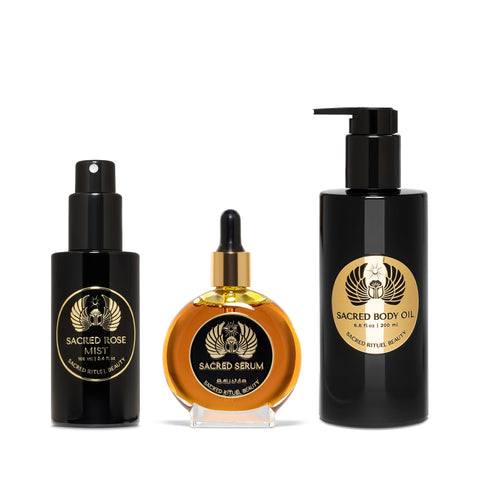


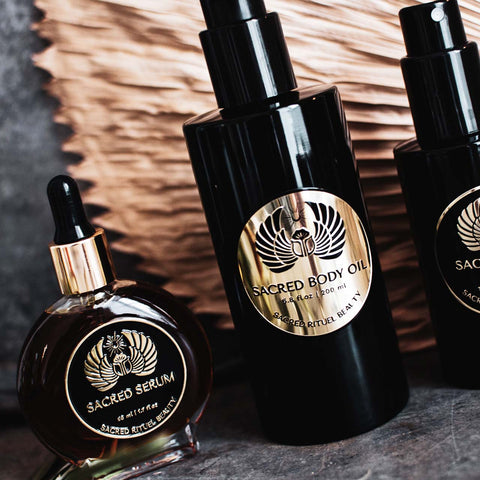
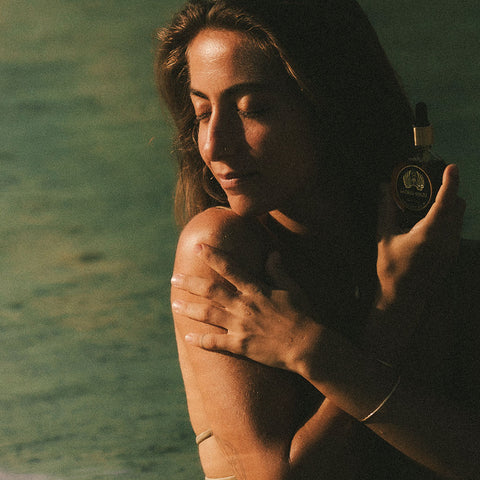
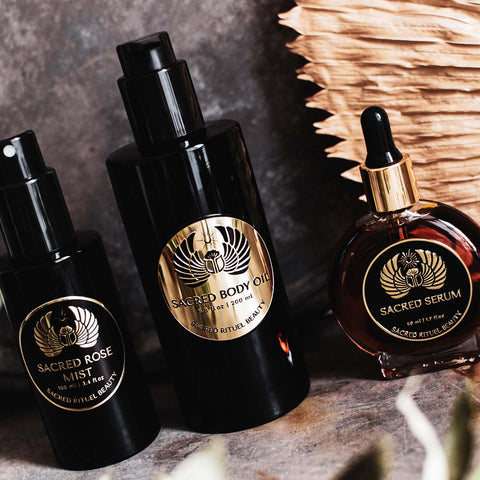

All Day Glow Essentials
Livraison express gratuite sur les commandes de plus de 100 $
Dépensez 100 $ et obtenez la livraison express GRATUITE. Dépensez 50 $ et obtenez la livraison standard GRATUITE. Livraison économique de 5 $ sur toutes les autres commandes.
Détails dans notre politique d'expédition .
Livraison automatique avec abonnement
Assurez-vous d'avoir TOUJOURS un flux constant de SACRED RITUEL à portée de main !
Détails dans notre page d'abonnements .
Retours sans tracas sous 30 jours
Essayez SACRED RITUEL pendant 30 jours et renvoyez-le pour un remboursement complet s'il ne répond pas complètement à vos attentes.
Détails dans notre politique de retour .
RITUEL SACRÉ est
Soins de la peau bio à haute puissance
Bulletin
Restez connecté sur les conseils de bien-être, les ventes exclusives et les événements !

